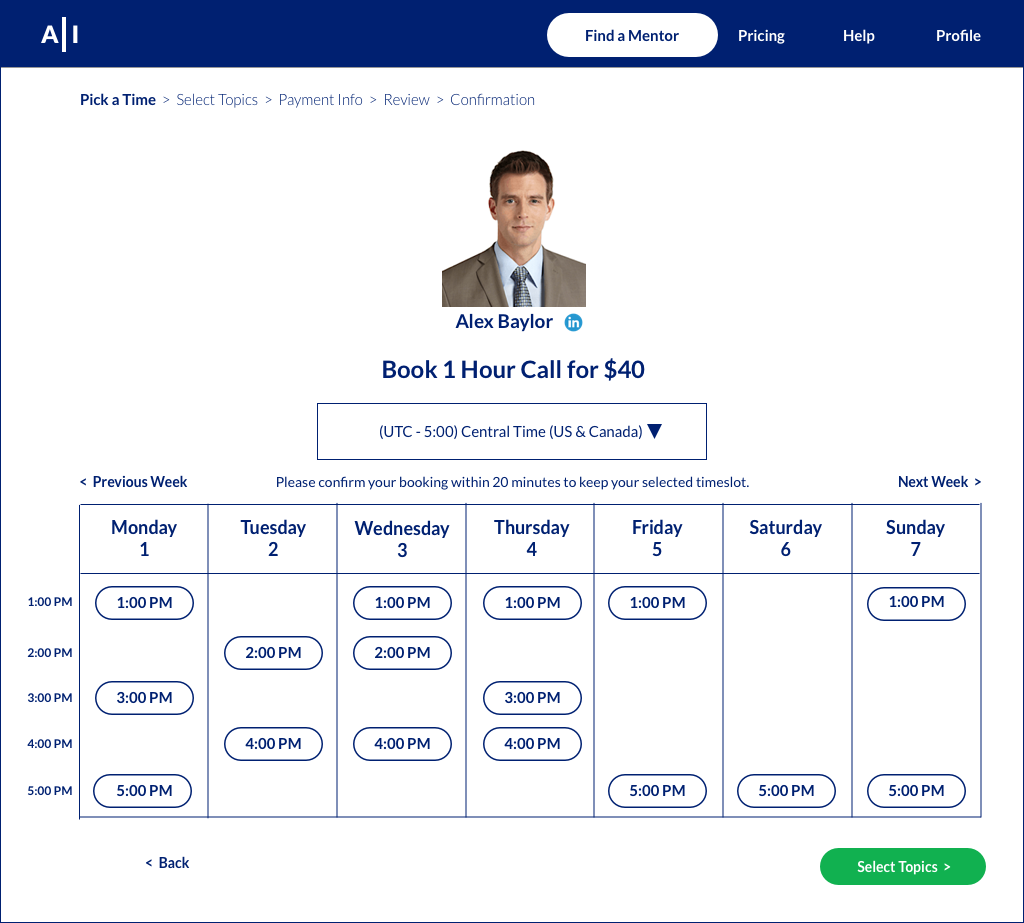AI Case Study
A-I
Providing mentorship for PhDs and postdocs transitioning from [A]cademia into [I]ndustry DESIGN CHALLENGE
PhDs and postdocs planning to transition from academia to industry often face a lot of questions, skepticisms, uncertainties, and emotions. However, they rarely know how to solicit mentorship to guide them through this transition. So, I created a platform to connect PhDs and postdocs to industry professionals (mentors). I was the lead designer responsible for UX research, UI design, and content strategy.
“I was desperate. I tried hard. But I got nothing. I needed help.”
-Lauretta, PhD in Biological Sciences
USER RESEARCH
Diary Studies. When it comes to landing an industry job, everyone’s experience, challenges, and triumphs are unique. To get a more accurate picture of participants’ experience and to inspire questions during interviews, I conducted seven diary studies to get participants to reflect on their experiences during the transition. In a period of seven days, using a survey, participants recorded their experiences when it comes to job searching or networking.
“I do not know where or how to solicit mentorship.”
-Benedek, Postdoc in Psychology
Initial Sketches: Finding a Mentor.
FINDING A MENTOR
In my design solution, I created a website where PhDs and postdocs can search for mentors based on filters, such as industry and years of experience. These filter categories were identified based on insights triangulated via different UX research methods (diary studies, interviews, surveys, usability testing) and analysis techniques (personas, affinity diagrams, empathy maps).
The first step to finding a mentor is to apply the relevant filters.
MENTOR PROFILE
In my design solution, I wanted to provide the right amount of information for users to make informed decisions to find a mentor, without overwhelming them. Insights from two rounds of usability testing suggest that experience, education, and reviews from past mentees were the most important.
Users want to know a mentor’s professional experience.
“I want to know more about their own experiences to help me understand if their experience will be useful for me.”
-Jesus, Postdoc in Human Behavior
Users want to know a mentor’s educational background.
“I want to see what’s their education and what kind of jobs they end up with.”
-Jesus, Postdoc in Human Behavior
Users want to see a variety of reviews from past mentees.
“I don’t want to see just one review from past mentees. I want a variety.”
-Galib, PhD in Chemistry
Users like the booking flow.
“Ah, this makes sense. This is better than what I thought I wanted.”
-Jee Eun, PhD in Human Behavior
Users want a see a review page before booking a call.
“I want to make sure I get to review everything again before booking a call.”
-Jee Eun, PhD in Human Behavior
Users can access more resources after booking their mentor call.
“Experience is what you get when you didn't get what you wanted. And experience is often the most valuable thing you have to offer.”
-Randy Pausch
Keen to know more about my project? Check these out:









